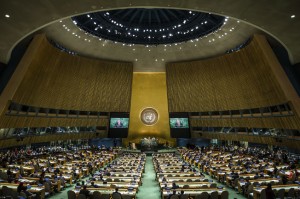Rules Are for Schmucks: The Censored UN Report
 The UN General Assembly in New York.
The UN General Assembly in New York. Politicians don’t want to hear what they don’t want to hear. That’s why some of them, like Sen. Marco Rubio (R-FL), have stopped holding town hall meetings with their constituents. Willful clapping of hands over the ears reached a new level at the United Nations last week, when Secretary-General António Guterres demanded and received the erasure of a report that had just been issued, analyzing whether Israel has violated international treaties prohibiting the practice of apartheid. As a bonus, Guterres won the resignation of its principal author—the woman with the audacity to tell him what he didn’t want to hear.
Guterres didn’t act alone. He was under intense pressure from US Ambassador to the United Nations Nikki Haley, representing an administration that absolutely doesn’t want to hear what it doesn’t want to hear. Just days before the report was censored, the Trump administration was threatening to slash funding for the UN. Perhaps the secretary-general thinks that being a loving lap dog will somehow spare him from our so-called president’s wrath. Good luck with that.
Ironically, the retraction of this report is the most wonderful thing that could have happened to it. If the UN version of Big Brother hadn’t clamped down on it so decisively, you wouldn’t be reading this article, because I wouldn’t have written it. One more UN report complaining about some injustice somewhere in the world…the eyes glaze over. But when something is so juicy that it has to be instantly withdrawn—I’m intrigued. And in this age of free information flow, it is impossible to effectively suppress anything; you can get the full report here, and an executive summary here.
So what was so explosive? Bear with me—we’ll get there in a minute. First, though, it is important to understand a little about the author of the report, and its overall context.
Israel uber-apologist Alan Dershowitz wrote in The Case for Israel (2011), “So long as criticism [of Israel] is comparative, contextual, and fair, it should be encouraged, not disparaged. But when the Jewish nation is the only one criticized for faults that are far worse among other nations, such criticism crosses the line from fair to foul, from acceptable to anti-Semitic.” Fair enough. The censored report’s author, now-jobless Rima Khalaf, has worked for the UN since 2000. Her primary mission has been preparing a series of thoughtful, well-evidenced reports documenting the “faults” of Israel’s Arab neighbors—of which there are many. Her 2004 report for example, in its own words, “provides a thorough examination of the deficit of freedom and good governance” in the Arab world. So she passes the Dershowitz litmus test with flying colors.
The report itself, unlike some other forbidden stuff I used to read, has no pictures. What makes it so dangerous is that it’s just the opposite—dry as dust. It starts by describing in lawyerly detail something I bet you didn’t know existed: the “International Convention on the Suppression and Punishment of the Crime of Apartheid,” adopted by the UN General Assembly in 1973. (I didn’t know about it, either.) The convention has a precise legal definition of “apartheid”: “inhuman acts committed for the purpose of establishing and maintaining domination by one racial group of persons over any other racial group of persons and systematically oppressing them.” The convention is now subsumed in the “Rome Statute” of the International Criminal Court (ICC), which lists apartheid as one of sixteen “crimes against humanity” (alongside other practices such as “extermination” and “sexual slavery”), defining it as “inhumane acts … committed in the context of an institutionalized regime of systematic oppression and domination by one racial group over any other racial group or groups and committed with the intention of maintaining that regime.”
Neither the US nor Israel recognizes the ICC, but over a hundred other countries do. A formal ICC verdict that Israel has committed a “crime against humanity” in the form of apartheid would make Israel’s position on the world stage all the more precarious. This is what makes the rest of the banned report, once the legal definitions are presented, so damning. Page after page, dry fact after dry fact, the report constructs an unassailable fortress of evidence that Israel is doing precisely what the Rome Statute says no nation should do: creating “an institutionalized regime of systematic oppression and domination by one racial group” over another.
“Racial” is a term used advisedly. Like the 1935 Nuremberg race laws, the Israeli legal structure has almost nothing to do with whether you prefer the Torah, the Koran, or the Humanist Manifesto, and everything to do with who your mother was. That’s race, not religion. As the banned report documents with excruciating precision, the Israeli system is as riddled with “systematic domination” of one racial group over another as South Africa ever was.
The Israeli government response to the report is as might be expected. They can’t possibly refute it, so they simply play the old ad hominem card of calling its authors Nazis. No one who reads the report will buy that. A decade ago, Jimmy Carter wrote a book called Palestine: Peace, Not Apartheid, saying basically the same thing. Is he a Nazi, too? Desmond Tutu, who should know what he’s talking about, uses the “a-word” to describe Israeli practice as well. Where the report may turn an important corner is in kicking off an international legal process that will ultimately produce enough sanctions to bring this crime against humanity to an end.
Apartheid cannot survive. It has never survived anywhere it’s been tried, and it’s not going to survive in Israel either. The sooner the Israeli government admits this and commences an orderly process of extending equal rights and dignity to everyone in the territory it controls, the better off everyone will be.
